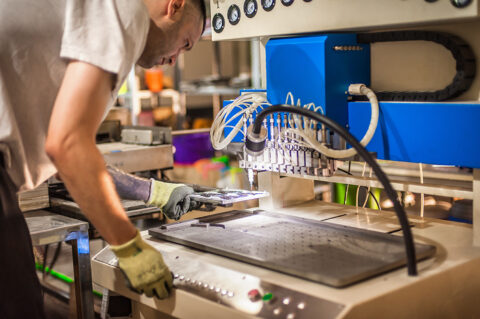If there’s a through-line in this week’s manufacturing headlines, it’s this: the ground is shifting beneath the old assumptions. For decades, policymakers reached for tariffs and trade wars to protect U.S. manufacturing. But this week, some of the country’s most consequential moves—from a $60 billion chip investment in Texas to AI breakthroughs in CNC programming—suggest a more powerful engine of change is emerging: technology as a force multiplier.
Goldman Sachs made waves with a report bluntly stating what many on the shop floor already know: tariffs alone can’t sustain a competitive advantage. Instead, it’s the adoption of robotics, AI, and next-gen automation that’s enabling U.S. manufacturers to leapfrog cost barriers and accelerate reshoring in meaningful ways. That reality is on full display as GE Appliances pulls washer production back from China to Kentucky, Toyota readies its massive EV battery facility in North Carolina, and rare-earth magnet capacity expands in Oklahoma—each example powered by advanced manufacturing systems and strategic investment.
Meanwhile, the national push for semiconductor sovereignty continues to gain momentum. Texas Instruments’ announcement of a massive fab complex in Sherman, Texas, marks one of the largest industrial expansions in recent memory. Coupled with smaller—but symbolically important—moves like a British AI firm helping U.S. machine shops reduce CAM programming times by 80%, these developments reflect a sector leaning forward into a new era.
Amid these positive shifts, warning lights are still flashing. Regional PMIs show uneven activity, and factory orders are softening. Tariff pressure is expanding to new product categories, raising questions about long-term strategy. But overall, this week reinforces a key message: the future of American manufacturing isn’t just about bringing production back—it’s about transforming how we build, compete, and connect at every level of the supply chain.
Main Stories
1. GE Brings Back Washers with a $490M Bet on Kentucky
-
The Story: GE Appliances is reshoring washer production from China, investing $490 million in its Louisville plant and adding 800 jobs.
-
Why It Matters: This marks a significant shift toward domestic manufacturing tied to advanced automation.
-
The Bigger Picture: Reshoring isn’t just about location—it’s about modernizing operations and workforce models to stay globally competitive.
AP News
2. Sherman, Texas Lands a $60B Chip Facility
-
The Story: Texas Instruments announced its new Sherman site as part of a $60 billion semiconductor expansion, expected to generate 60,000+ jobs.
-
Why It Matters: This is a cornerstone project in America’s chip sovereignty strategy.
-
The Bigger Picture: Semiconductor production is anchoring new regional ecosystems built around tech, labor, and resilience.
Axios
3. Automation Is the New Tariff
-
The Story: Goldman Sachs reports that AI and robotics now have more impact on U.S. manufacturing competitiveness than trade policy.
-
Why It Matters: Companies like PepsiCo and Tetra Pak are turning to predictive systems and robotics to boost productivity and reduce cost exposure.
-
The Bigger Picture: Strategic tech adoption is shifting the competitive landscape in favor of innovative, distributed U.S. manufacturers.
Business Insider
4. Rare Earths and Battery Supply Chains Come Home
-
The Story: USARE’s Stillwater plant and MP Materials’ magnet production for GM expand rare-earth manufacturing; Toyota’s NC plant prepares to produce 800,000 EV battery packs annually.
-
Why It Matters: Critical materials production is now a national security priority.
-
The Bigger Picture: The U.S. is moving quickly to localize control over EV and defense-related materials.
Washington Post
Wikipedia
5. CAM Assist AI Cuts CNC Setup Time by 80%
-
The Story: UK-based CloudNC’s CAM Assist software launches in U.S. machine shops, automating tool path generation and drastically reducing programming time.
-
Why It Matters: This directly addresses the skilled labor bottleneck in small machine shops.
-
The Bigger Picture: AI is enabling small manufacturers to compete with faster turnaround and more flexibility.
The Times
- PMI Watch: June factory PMI held at 52.8, with regional divergences; NY Fed index dropped to -16.
- Factory Orders: Orders fell 3.7% in April after front-loading from tariff announcements.
- New Facilities: Amazon’s Zoox starts robotaxi production in CA; Alstom opens $75M railcar plant in NY.
- Tariffs Expand: New 50% tariffs now cover appliances as of June 23.
- New Concepts: Researchers released a maglev conveyor and a digital twin tool for real-time throughput recovery.
By the Numbers: 3 Quick Stats
- $60B+ in semiconductor and rare-earth investments announced this week alone.
- GE’s $490M reshoring project brings 800 jobs and robotics-enhanced washer production back from China.
- CAM Assist AI cuts CNC setup time by up to 80%, boosting capacity for small shops.
Looking Ahead
Eyes will be on July PMI data, CHIPS Act implementation timelines, and further guidance on reshoring incentives. The message remains clear: American manufacturing is moving—not backward to nostalgia, but forward into a more agile, resilient, tech-powered future.




